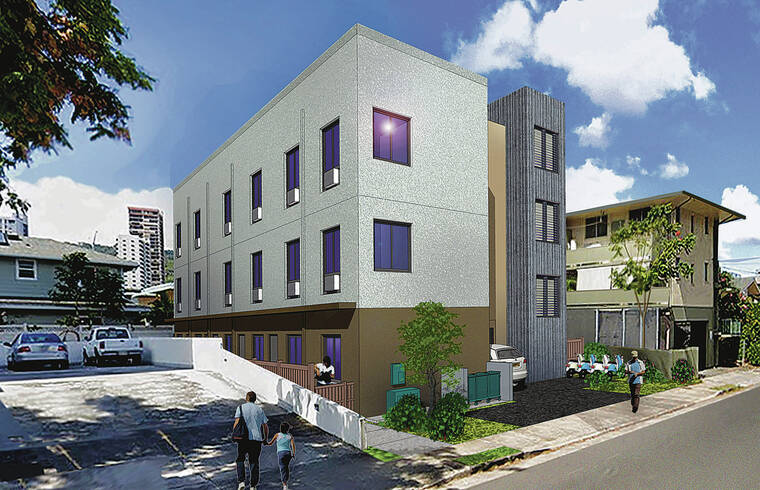In December, Paul Lam broke ground on a 26-unit, three-story walk-up for low-income renters in Makiki.
As the principal of Lam Capital LLC, the developer used a city program that pushes for more affordable housing on Oahu.
Lam said he plans to use that same program again for a similar project, to be built just a few blocks away from the first.
On Saturday, the developer will host a 9 a.m. groundbreaking ceremony — to be attended by Honolulu Mayor Rick Blangiardi and City Council member Calvin Say, whose district includes Makiki — for 25 affordable rental units at 1226 Kinau St., across from the Beretania Street Safeway
supermarket.
“It’s a three-story walk-up, just like the other one,” said Lam, “but this one has three, one-bedrooms and 22
studios.”
Both projects were motivated by the city’s prior introduction of Bill 7, which makes it easier for private developers to increase Oahu’s inventory of affordable units. That measure provides tax incentives and real property tax exemptions for 10 years while expediting planning and permitting with no fees.
“We feel that the Bill 7 project, with private investment in affordable housing, is one solution to the overall housing crisis that we’re in,” Lam said, noting Honolulu had a shortage of about 22,000 housing units. “But we feel that affordable housing must be solved in urban Honolulu, that people can afford reasonable housing closer to where they work.”
He noted beyond these two projects, his company plans to build more affordable housing in and around the downtown area.
“We have something like six to seven projects in different, various stages of development,” Lam added.
Approved in 2019, Bill 7 was signed into law by then-Mayor Kirk Caldwell to “create a temporary program to accelerate the construction of affordable rental housing” on apartment and business mixed-use-zoned properties by relaxing zoning and building code standards and offering financial incentives to developers, the measure states.
Importantly, the city says Bill 7’s original impetus was to redevelop 3,204 smaller lots — 5,000 to 20,000 square feet in size — for higher density properties zoned for apartments. And the measure was supposed to create up to 21,000 additional units for properties zoned for apartments, mixed-use apartments and mixed-use businesses.
In exchange for allowing more apartments to be
built on a property, the apartment rents must be affordable to tenants who earn up to 100% of the area median income.
According to Lam, his company’s first project at 1427 Ernest St. — with 24 studios and two, one-bedroom units which started construction in January — is almost complete.
“It’s finished,” Lam said, but noted his project awaits a city Department of Planning and Permitting certificate of occupancy, so he
can legally allow tenants to move into the building. “We will hopefully get it by the end of this month.”
He said the Ernest Street project has garnered “really strong interest” in terms of leasing. “We’ve probably got three-quarters of the units with applications already,” he added.
Lam also noted potential renters earning up to 80% of the area median income — for a family of four that equates to annual income of $104,800 — are applying. Under that project, leasing a studio unit is about $1,500 a month, which includes all utilities like electricity, gas, water, and trash pickup.
“It includes everything,” he said.
Moreover, Lam noted his company’s next affordable rentals are coming soon, with a 90-unit project on Pensacola Street and a 53-unit project on Alapai Street. Those projects — anticipated for completion in the next two years — will provide an additional 143 affordable housing units in urban Honolulu, he said.
Although the city touts
affordable housing
development under Bill 7, the pace of development under the measure — which had a goal of producing 500 affordable rental units per year — has been markedly slow.
Since the measure’s passage into law over four years ago, the city says only nine Bill 7 projects have
materialized.
In August, DPP Director Dawn Takeuchi Apuna told the Honolulu Star-Advertiser those projects — offering 229 units — were among a total of 43 projects that fall under Bill 7’s purview.
“While the number of approved projects has not met expectations, there are 34 applications that are still being reviewed by DPP,” Takeuchi Apuna said via email. “If all are approved, they will result in nearly 1,300 affordable rental units available to our residents.”
She’d assert that part of the reason for delays in advancing Bill 7 projects was effectively due to Bill 7 itself.
“Bill 7 is not the easiest
law to work with because it tries to strike a balance between life/safety issues and providing more flexibility for cost-savings for these smaller developments,” she said.
Other challenges — some apparently due to developers — persist as well, the city says.
According to an Aug. 23 DPP presentation on Bill 7, those challenges include a lack of general coordination and completeness of designs provided by developers; insufficient or missing information, which prevents verification of code compliance; and conflicts of information over plans including unit layouts and locations for utility services and other equipment.
Meanwhile, Takeuchi Apuna said the city’s commitment to Bill 7 and its affordable housing projects will continue for years to come, albeit in a new form.
“The City Council believes there is a future for Bill 7 projects, and therefore approved the extension of the waivers and incentives for another seven years,” she said, alluding to the fact that Bill 7 was set to expire by 2024. “On June 1, Mayor Blangiardi signed Bill 8, which extended Bill 7 for
another seven years.”

